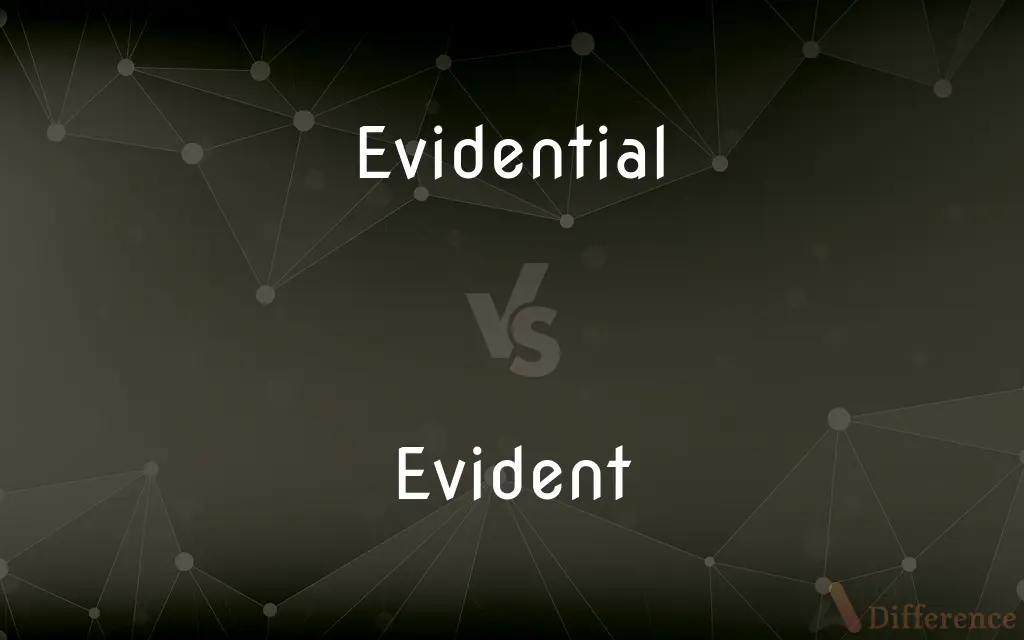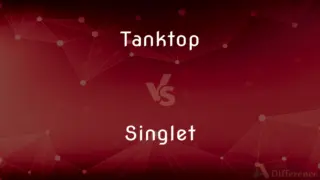Evidential vs. Evident — What's the Difference?
By Urooj Arif & Fiza Rafique — Updated on April 1, 2024
Evidential pertains to evidence or is based on it, while evident is something clear or obvious without needing proof.

Difference Between Evidential and Evident
Table of Contents
ADVERTISEMENT
Key Differences
Evidential refers to anything that is related to, provides, or is derived from evidence. It is often used in contexts where the support or justification for an assertion is based on evidence. Whereas evident describes something that is clear, obvious, and visible directly, often without the need for detailed explanation or evidence.
While evidential materials or arguments rely on evidence to substantiate claims or findings, making them crucial in legal, scientific, and academic contexts, something evident is immediately perceivable by the senses or easily understood from basic observation, requiring no further evidence to be acknowledged as true.
Evidential supports are typically required in situations where there is a need to prove a hypothesis, a claim, or a fact. This could involve various forms of data, documents, or testimonial evidence. On the other hand, evident truths or facts are accepted as they are visibly clear or immediately understandable, such as the evident brightness of the sun on a clear day.
In academic writing or research, evidential support is crucial for the credibility of the findings or arguments presented. Researchers gather evidential support through experiments, observations, or literature review. Conversely, evident facts in such writings are those that are widely accepted or observable without further justification, serving as a basis for more complex arguments or studies.
The use of evidential information often involves a process of verification and scrutiny to establish its validity and relevance to the matter at hand. This contrasts with evident facts or situations, which are universally recognized and accepted without the need for verification.
ADVERTISEMENT
Comparison Chart
Definition
Relating to, providing, or derived from evidence
Clear, obvious, and visible without evidence
Usage Context
Legal, scientific, academic
Common understanding, basic observations
Requirement
Verification, proof
None, inherently clear
Role in Argument
Supports claims with evidence
Facts or truths accepted without proof
Perception
Requires scrutiny and analysis
Immediately perceivable or understandable
Compare with Definitions
Evidential
Relating to the study or use of evidence.
Evidential reasoning is vital in forensic science.
Evident
Manifesting without any doubt.
His expertise in the subject was evident during the discussion.
Evidential
Based on evidence rather than theory.
His conclusions were evidential, supported by data from the experiment.
Evident
Clearly seen or understood; obvious.
The joy on her face was evident.
Evidential
Pertaining to evidence used to support an argument.
The evidential documents were crucial in proving the case.
Evident
Unquestionably apparent to the senses.
The damage to the building was evident from the street.
Evidential
Serving as evidence in an investigation.
The fingerprints were evidential in linking the suspect to the scene.
Evident
Not needing proof or explanation.
The benefits of regular exercise are evident.
Evidential
Derived from direct evidence or proof.
The evidential findings helped establish the new theory.
Evident
Directly perceivable by the mind.
The logic behind her argument was evident.
Evidential
Relating to, providing, or constituting evidence; evidentiary.
Evident
Easily perceived or understood; obvious.
Evidential
Of or providing evidence.
Evident
Obviously true by simple observation.
It was evident she was angry, after she slammed the door.
Evidential
(linguistics) A syntactic element (affix, clitic, or particle) that indicates evidentiality.
Evident
Clear to the vision; especially, clear to the understanding, and satisfactory to the judgment; as, the figure or color of a body is evident to the senses; the guilt of an offender can not always be made evident.
Your honor and your goodness is so evident.
And in our faces evident the signsOf foul concupiscence.
Evidential
Relating to, or affording, evidence; indicative; especially, relating to the evidences of Christianity.
Evident
Clearly apparent or obvious to the mind or senses;
The effects of the drought are apparent to anyone who sees the parched fields
Evident hostility
Manifest disapproval
Patent advantages
Made his meaning plain
It is plain that he is no reactionary
In plain view
Evidential
Serving as or based on evidence;
Evidential signs of a forced entry
Its evidentiary value
Evident
Capable of being seen or noticed;
A discernible change in attitude
A clearly evident erasure in the manuscript
An observable change in behavior
Common Curiosities
What does evidential mean?
Evidential means related to, providing, or derived from evidence.
Can a fact be both evident and evidential?
Yes, a fact can be both evident if it is obvious and also serve as evidential support in an argument.
How is evidential information used in legal contexts?
In legal contexts, evidential information is used to support or refute claims and allegations during trials.
Why is evidential support important in research?
Evidential support is important in research to substantiate claims, ensuring the credibility and reliability of findings.
Can something be evident without being directly observed?
Typically, something is considered evident because it is directly observable or easily deducible, but it can also be understood as evident through logical reasoning.
Is there a difference in how evidential and evident are perceived in scientific vs. everyday contexts?
In scientific contexts, both terms are used with precision: evidential for evidence-based assertions and evident for clearly observable phenomena. In everyday contexts, the distinctions might be less rigorously applied but still imply a difference between what requires proof and what is plainly observable.
What is meant by evident?
Evident refers to something that is clearly seen or understood without the need for proof.
Is something evident always true?
While something evident is clearly perceived and believed to be true, further investigation may sometimes reveal more complex realities.
How do evidential arguments differ from theoretical ones?
Evidential arguments are based on empirical evidence, while theoretical ones may rely on abstract principles or models without direct evidence.
Can an evident fact require further explanation?
An evident fact typically does not require further explanation as it is clear and obvious, but its implications may be explored in more detail.
How do evidential and evident contribute to knowledge?
Evidential contributes to knowledge by providing a foundation of evidence for understanding, while evident facts form the basis of immediate knowledge without the need for further investigation.
What role does evidential play in scientific discovery?
Evidential plays a crucial role in scientific discovery as it provides the empirical basis for validating hypotheses and theories.
What makes something evidential in academic writing?
In academic writing, something is evidential if it is cited as evidence to support claims, arguments, or hypotheses.
How do lawyers use evidential material?
Lawyers use evidential material to build cases, presenting evidence to support legal arguments and persuade judges or juries.
Is evident subjective?
What is evident may sometimes be subjective, depending on an individual's perception or understanding, but it often refers to what is universally clear or obvious.
Share Your Discovery

Previous Comparison
Tanktop vs. Singlet
Next Comparison
Shirt vs. TunicAuthor Spotlight
Written by
Urooj ArifUrooj is a skilled content writer at Ask Difference, known for her exceptional ability to simplify complex topics into engaging and informative content. With a passion for research and a flair for clear, concise writing, she consistently delivers articles that resonate with our diverse audience.
Co-written by
Fiza RafiqueFiza Rafique is a skilled content writer at AskDifference.com, where she meticulously refines and enhances written pieces. Drawing from her vast editorial expertise, Fiza ensures clarity, accuracy, and precision in every article. Passionate about language, she continually seeks to elevate the quality of content for readers worldwide.















































